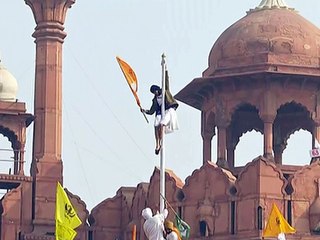 W
WThe 2021 Farmers' Republic Day protest was a protest on 26 January 2021 in Delhi, India. Part of the 2020–2021 Indian farmers' protest, it turned violent when a group of protestors deviated from the parade to storm the Red Fort. The protest took place on the 72nd Republic Day against the decision by Narendra Modi-led National Democratic Alliance (NDA) to implement three farm acts.
 W
WAlluri Sitarama Raju was an Indian revolutionary involved in the Indian independence movement. After the passing of the 1882 Madras Forest Act, its restrictions on the free movement of tribal people in the forest prevented them from engaging in their traditional podu agricultural system, which involved shifting cultivation. Alluri led the Rampa Rebellion of 1922, during which a band of tribal people and other sympathisers fought in the border areas of the East Godavari and Visakhapatnam regions of Madras Presidency, in present-day Andhra Pradesh, against the British Raj, which had passed the law. He was referred to as "Manyam Veerudu" by the local villagers.
 W
WKanaklata Barua, also called Birbala and Shaheed (martyr), was an Indian independence activist and AISF leader who was shot dead by the British police while leading a procession bearing the National Flag during the Quit India Movement of 1942.
 W
WKomaram Bheem (1900/1901–1940) alternatively Kumram Bheem was a rebel leader in British India from the Gond community, who in association with other Gond leaders and communist revolutionaries led a protracted low intensity rebellion against the feudal Nizamate of Hyderabad and the British Raj in the eastern part of the princely state during the 1930s which contributed in the culmination of the Telangana Rebellion.
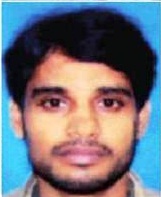 W
WBarun Biswas was a Bengali school teacher and a social activist in Sutia, West Bengal, India. In 2000, he co-founded "Sutia Gonodhorshon Pratibad Mancha", an organisation which protested against a local criminal gang, who were using gang-rape to terrorise the people of Sutia. Biswas was murdered on 5 July 2012. In 2013, a Bengali film Proloy was made, based on his life and fight.
 W
WAmar Singh Chamkila was an Indian singer, songwriter, musician, and composer of Punjabi music. Chamkila and his wife Amarjot were killed, along with two members of their band on 8 March 1988 in an assassination which remains unresolved.
 W
WVinod Kumar Choubey, KC was an Indian Police Service officer of 1998 batch who was killed in an encounter with naxalites in the Rajnandgaon ambush in July 2009. Choubey was posthumously awarded with peacetime gallantry award Kirti Chakra.
 W
WNarendra Achyut Dabholkar was an Indian physician, social activist, rationalist and author from Maharashtra, India. In 1989 he founded and became president of the Maharashtra Andhashraddha Nirmoolan Samiti. Triggered by his murder on 20 August 2013, the pending Anti-Superstition and Black Magic Ordinance was promulgated in the state of Maharashtra, four days later. In 2014, he was posthumously awarded the Padma Shri for social work.
 W
WHavildar Hangpan Dada AC was a soldier in the Assam Regiment of the Indian Army. He was posthumously awarded the Ashoka Chakra, India's highest peacetime military decoration in August 2016.
 W
WPrivate James Joseph Daly was a member of a mutiny of the Connaught Rangers in India in 1920 in protest of the activities of the British army in Ireland. He was executed in the aftermath of the mutiny by crown forces.
 W
WAbdul Majeed Dar was a leader of the people of Kashmir and the former chief commander of the militant group Hizbul Mujahideen in Jammu & Kashmir till 2001. He has been described as a "sane voice in J&K who realized the futility of the gun". He later gave up violence and sought to restore peace in Kashmir.
 W
WMaharaja Sriram Chandra Bhanjadeo was the Maharaja of Mayurbhanj State of India.
 W
WPhoolan Devi, popularly known as "Bandit Queen", was an Indian female rights activist, bandit and politician from the Samajwadi Party who later served as Member of Parliament.
 W
WBrahm Dutt Dwivedi (-1997) was an Indian cabinet minister in Government of Uttar Pradesh, and a senior leader of the Bharatiya Janata Party. Dwivedi was shot dead in Farrukhabad district in February 1997. His widow Prabha later contested the election to the assembly. He protected Mayawati against physical assault during the 2 June 1995 guest house scandal.
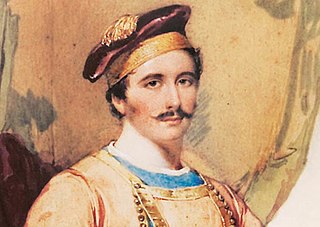 W
WWilliam Fraser was a British India civil servant who was an Agent to the Governor General of India and Commissioner of the Delhi Territory during the reign of the last Mughal Emperor, Bahadur Shah Zafar. He was a brother of James Baillie Fraser.
 W
WIndira Priyadarshini Gandhi was an Indian politician and a central figure of the Indian National Congress. She was the 3rd prime minister of India and was also the first and, to date, only female prime minister of India. Indira Gandhi was the daughter of Jawaharlal Nehru, the 1st prime minister of India. She served as prime minister from January 1966 to March 1977 and again from January 1980 until her assassination in October 1984, making her the second longest-serving Indian prime minister after her father.
 W
WMohandas Karamchand Gandhi was an Indian lawyer, anti-colonial nationalist and political ethicist who employed nonviolent resistance to lead the successful campaign for India's independence from British rule and in turn inspired movements for civil rights and freedom across the world. The honorific Mahātmā, first applied to him in 1914 in South Africa, is now used throughout the world.
 W
WThe December 2005 IISc shooting occurred on Wednesday, 28 December 2005 at the Indian Institute of Science (IISc) in the Indian city of Bangalore, killing Prof. Munish Chandra Puri of IIT Delhi and injuring four, after two or more unidentified gunmen fired at Puri and others. The state government of Karnataka declared the shooting to be a terrorist attack, making it the first such attack in Bangalore.
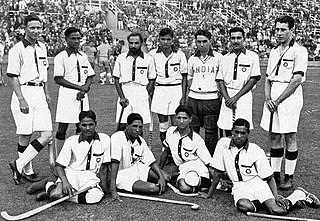 W
WSayed Mohammad Jaffar Shah was an Indian field hockey player who competed in the 1932 Summer Olympics and 1936 Summer Olympics.
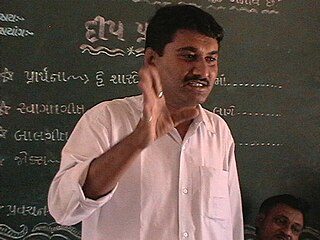 W
WAmit Jethwa was an Indian environmentalist and social worker, active in the Gir Forest area near Junagadh, Gujarat. He had filed several court cases against illegal mining in the protected area, naming, Dinu Solanki as one of the respondents. On 20 July 2010 he was shot dead by two assailants on a motorbike. In Sept 2012, the Gujarat High Court, severely criticized investigations by the Gujarat police who had "given a clean chit" to Solanki, despite arresting his nephew; the court ordered the Central Bureau of Investigations (CBI) to take up the case. In November 2013, CBI arrested Dinu Solanki in connection with having ordered the murder. On 11 July 2019, Dinu Solanki and his nephew Shiva Solanki were convicted for the murder.
 W
WMalleshappa Madivalappa Kalburgi, commonly known as M. M. Kalburgi, was an Indian scholar of Vachana sahitya in the Kannada-language and academic who served as the vice-chancellor of Kannada University in Hampi. A noted epigraphist of Kannada, he was awarded the National Sahitya Akademi Award in 2006 for Marga 4, a collection of his research articles.
 W
WAshok Kamte AC was an Indian police officer, serving as the Additional Commissioner of the Mumbai Police supervising the Eastern region. He was martyred in action during the 2008 Mumbai attacks. He was posthumously given the Ashoka Chakra on 26 January 2009.
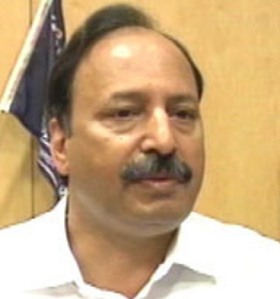 W
WHemant Karkare AC was the chief of the Mumbai Anti-Terrorist Squad (ATS). He was killed in action during the 2008 Mumbai attacks. In 2009, he was posthumously given the Ashoka Chakra, India's highest peacetime gallantry decoration.
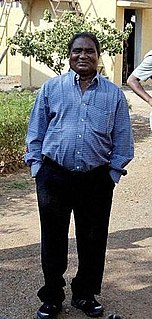 W
WMahendra Karma was an Indian political leader belonging to Indian National Congress from Chhattisgarh. He was the leader of the opposition in the Chhattisgarh Vidhan Sabha from 2004 to 2008. In 2005, he played a top role in organising the Salwa Judum movement against Naxalites, a Maoist group in Chhattisgarh. He was a Minister of Industry and Commerce in the Ajit Jogi cabinet since the state formation in 2000 to 2004. He was assassinated by Naxalites on 25 May 2013 in a Maoist attack while returning from a Parivartan Rally meeting organised by his party in Sukma.
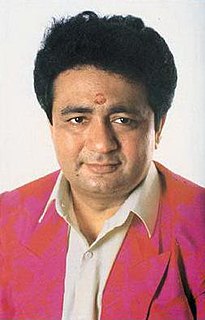 W
WGulshan Kumar Dua, was an Indian businessman who was the founder of the T-Series music label, and a Bollywood movie producer. He founded T-Series in the 1980s and established it as a leading record label in the 1990s.
 W
WBenakanahalli Alappa Shivakumar (1951–1990), was a ganglord and organized crime boss who headed the Bangalore underworld in the 1980s along with other notable figures such as M. P. Jayaraj and Kotwal Ramachandra. Activities include racketeering, substantial control of city's oil supply, labour unions, film distribution through his company SK Pictures in Gandhinagar, money laundering, monopolistic contract bidding and large-scale manipulation of state bureaucracy and politics. He was killed on 20 November 1990.
 W
WJessica Lal was a model in New Delhi who was working as a celebrity barmaid at a crowded socialite party when she was shot dead at around 2.00am on 30 April 1999. Dozens of witnesses pointed to Siddharth Vashisht, also known as Manu Sharma, the son of Venod Sharma, a wealthy and influential Congress-nominated Member of Parliament from Haryana, as the murderer. Manu Sharma was later convicted for the murder and sentenced to prison.
 W
WGauri Lankesh was an Indian journalist-turned-activist from Bangalore, Karnataka. She worked as an editor in Lankesh Patrike, a Kannada weekly started by her father P. Lankesh, and ran her own weekly called Gauri Lankesh Patrike. She was assassinated outside her home in Rajarajeshwari Nagar on 5 September 2017. At the time of her death, Gauri was known for being a critic of right-wing Hindu extremism. She was honoured with Anna Politkovskaya Award for speaking against right-wing Hindu extremism, campaigning for women's rights and opposing caste based discrimination.
 W
WHarchand Singh Longowal was the President of the Akali Dal during the Punjab insurgency of the 1980s. He had signed the Punjab accord, also known as the Rajiv-Longowal Accord along with Rajiv Gandhi on 24 July 1985. The government accepted most of the demands of Akali Dal who in turn agreed to withdraw their agitation. Less than a month after signing the Punjab accord, Longowal was assassinated by the Sikh groups who felt let down by the accord and opposed it.
 W
WPramod Vyankatesh Mahajan was an Indian politician from Maharashtra. A second-generation leader of the Bharatiya Janata Party (BJP), he belonged to a group of relatively young "technocratic" leaders. At the time of his death, he was in a power struggle for the leadership of the BJP, given the imminent retirement of its aging top brass.
 W
WShanmugam Manjunath was a sales officer for the Indian Oil Corporation who was murdered for sealing a corrupt petrol station in Lakhimpur Kheri, Uttar Pradesh. This incident inspired several students at IIM, IIT and other institutes culminating with the IIM students setting up "The Manjunath Shanmugam Trust".
 W
WSyed Modi (1962–1988), born as Syed Mehdi Hassan Zaidi, was an Indian badminton singles player. He was eight-time National Badminton champion (1980–1987). His most notable achievement at the international badminton circuit came in the form of men's singles title at the 1982 Commonwealth Games. He also won three other international titles, namely Austrian International and USSR International, both of which were European Badminton Circuit tournaments.
 W
WMoulvi Muhammad Baqir (1780–1857) was a Shia scholar, an Indian independence activist and journalist based in Delhi. He was the first journalist to be executed following rebellion in 1857. He was arrested on 16 September 1857 and executed by gunshot two days later without trial.
 W
WThe Indian Army base in Nagrota, Jammu and Kashmir was attacked on 29 November 2016 by a group of militants. During the ensuing gun battle, seven Indian soldiers, including two officers and all three militants were killed.
 W
WLala Jagat Narain was an Indian editor, member of the Punjab Legislative Assembly, Member of Parliament and founder of the Hind Samachar media group.
 W
WCorporal Jyoti Prakash Nirala, AC was a member of the Garud Commando Force. He was posthumously awarded the Ashoka Chakra, India's highest peacetime military decoration in January 2018. He is the first airman to receive the award for ground combat and only the third one to receive it overall after Suhas Biswas and Rakesh Sharma.
 W
WCaptain Keishing Clifford Nongrum, MVC was an Indian Army officer of 12 Jammu and Kashmir Light Infantry, who was posthumously awarded the Maha Vir Chakra, India's second-highest gallantry award, for exemplary valor in combat during operations in the Kargil War in 1999.
 W
WTukaram Omble AC was a Mumbai police officer and army soldier, who served as assistant sub-inspector (ASI) of the Mumbai Police. He was martyred in action while fighting terrorists during the 2008 Mumbai attacks, at Girgaum Chowpatty Mumbai, and was instrumental in apprehending Ajmal Kasab alive. The lone surviving terrorist Kasab was later convicted and hanged. The Indian government posthumously honoured Omble, on 26 January 2009, with the Ashoka Chakra – the country's highest peace-time gallantry award for extraordinary bravery and valour in the line of duty.
 W
WGhulam Hassan Pinglana was an Indian politician who was assassinated by unknown gunman in his home village of Pinglana, Pulwama district, Jammu and Kashmir.
 W
WBrij Behari Prasad, also spelled Brij Bihari Prasad was an Indian politician. A member of the Rashtriya Janata Dal (RJD), he had become Minister for Science and Technology in the state of Bihar, where he represented the RJD. He had been arrested for alleged involvement in corrupt admissions to technical institutes and was murdered on 13 June 1998 while being treated at the Indira Gandhi Institute of Medical Sciences in Patna, where he was undergoing treatment while in custody. It was claimed that his death was in retribution for those of Chhottan Shukla and five other people, who had been killed on 4 December 1994 when on their way home from campaigning for the Bihar Legislative Assembly elections that were to take place in 1995. Shukla was a gangster from the Bhumihar community, whereas Prasad was a Bania. Supporters of Prasad were thought to have been responsible for the killing of Shukla.
 W
WMunish Chander Puri was Professor Emeritus of Mathematics at IIT Delhi. He was Organizing Chair, Asia Pacific Operational Research Societies (APORS). He was killed in Bangalore in the 2005 Indian Institute of Science shooting.
 W
WRajdev Ranjan, also known as Rajdeo Ranjan, who was an Indian journalist for the Hindustan Daily in Siwan, Bihar, India, was shot to death. His death received significant media coverage and was seen as a threat to journalism. He is known to have been writing against Mohammad Shahabuddin, a former Rashtriya Janata Dal MP, who was serving a life sentence in prison for being connected to the murder of two brothers. Five contract killers were arrested, during the same month of Ranjan's murder, on May 25, 2016.
 W
WPatel Sudhakar Reddy was a leader of the central committee of the Communist Party of India (Maoist).
 W
WVijay Salaskar AC was an Indian police inspector and encounter specialist with the Mumbai police. He was widely credited with killing 75–80 criminals in encounters – most of these were members of the Arun Gawli gang. Salaskar was killed while fighting terrorists in the November 2008 Mumbai attacks. Captured terrorist Ajmal Amir Kasab claimed responsibility for the killing. Before his death Salaskar was head of the Anti-Extortion Cell, Mumbai. His patriotism and bravery was honoured with the Ashoka Chakra on 26 January 2009.
 W
WDattatray Samant, also known as Datta Samant, and popularly referred to as Doctorsaheb, was an Indian politician and trade union leader, who is most infamous for leading 200–300 thousand textile mill workers in the city of Bombay on a year-long strike in 1982, which triggered the closure of most of the textile mills in the city.
 W
WGajender Singh Bisht was an NSG commando and Havildar (Sergeant) who was martyred during the 2008 Mumbai attacks. His act of bravery was honoured with the Ashoka Chakra award by the President of India on 26 January 2009, India's Republic Day.
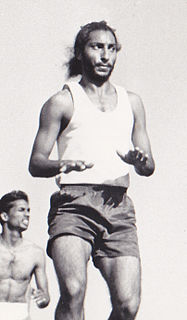 W
WPrithipal Singh was an Indian field hockey player nicknamed the “King of short corner” by hockey commentators. He participated in the Olympic field hockey three times and each time he scored the highest number of goals as a single player. Singh was a player with sharp reflexes, and the tremendous strength in his long and powerful arms produced firm and sticking shots which unfailingly fetched him goals and often the winners. The Evening Post, New Zealand commented in 1961 that to face the fury of Prithipal's hit is to risk one's life. Another author commented that if Arjuna was the maharathi of the Mahabharata war, Prithipal was the maharathi of the International Hockey game. The first-ever Arjuna Award to a hockey player was conferred upon him in 1961, which was later followed by the Padma Shri in 1967. Singh won Olympic medals in Rome, Tokyo and Mexico.
 W
WGeneral Arunkumar Shridhar Vaidya PVSM, MVC & Bar, AVSM, ADC was a General Officer in the Indian Army. He served as the 13th Chief of the Army Staff from 1983 to 1986. Following his retirement, he was assassinated by Harjinder Singh Jinda and Sukhdev Singh Sukha, Sikh militants of the Khalistan Commando Force in August 1986. This was done in vengeance of Operation Blue Star. General Arun Vaidya commanded this operation.